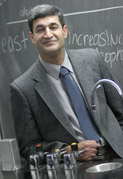In focus
Eby Noroozi: The rewards of safety
In a chemistry lab, failure to attend to details can result in far-reaching health and safety hazards. Macdonald Campus, home to chemistry and biology labs, is also home to a plethora of hazardous waste — radioactive, biochemical and medical. If that sounds worrying, rest easy. McGill's Ebrahim ("Eby") Noroozi, laboratory manager in the Food Science and Agricultural Chemistry Department in the Faculty of Agricultural and Environmental Sciences at Macdonald Campus, is the winner of this year's Board of Canadian Registered Safety Professionals (BCRSP) Volunteer Award.

Owen Egan
The BCRSP provides training and accreditation for safety professionals in a wide range of fields, including pharmaceutical, hydro and mining, as well as agri-food business. The BCRSP chose Noroozi for the award, which will be presented in June, for his 10 years of service and chairing the Quebec BCRSP section and his constructive input to the organization.
Many today are currently fixated on the contents of the food we ingest, what with the controversy surrounding mad cow disease and GMOs. Less widely known are the external safety implications related to food industry manufacturing and transport. "Agriculture and food processing sectors are considered third and fourth after mining manufacturing sectors with the highest injury rate," Noroozi points out. It is possible that while organic soymilk may be good for the purchaser, it could pose health risks to workers in a packaging plant in a distant country.
Civic-minded and pragmatic, Noroozi says all organizations — commercial, public and educational — should be concerned with health and safety. "As soon as you have an accident, it is not only the suffering and loss of life of the person," he points out, but also the injury or damage to process, machinery, property or the environment — resulting in a loss of reputation, increased insurance premiums and eventually loss of profit.
Health and safety is "not just having a fire extinguisher around the corner; it's a management issue," he says.
"Safety is a ladder, it's not just one person's responsibility; it is a shared responsibility and everybody's — from the lowest person who works in a lab to the highest at top."
If Noroozi has engrossed himself in details while interviewing BCRSP candidates, developing course content or producing papers — such as the paper he will present at the upcoming 15th National Food Industry Congress in Tehran, "Modelling storage conditions and packaging of raw dried pistachio nuts" — he sees himself as part of a much larger picture, starting from his beloved Macdonald Campus (which he joined in 1975, as a student from Iran), to McGill, Canada and the international sphere. He was a founder of the first Iranian Food Industry Health and Safety committee, and will receive the Iranian Food Science and Technology Association National Food Industry Award this year. He was also part of the first official Agri-Food Trade Mission from Canada to Iran two years ago.
On his upcoming trip he will also raise money for victims of the recent earthquakes in Iran, in memory of his late mother-in-law, a woman he describes as having "a great heart to benefit those who have great needs."
On a personal level, he takes evident pride in a photo taken of him, his son and Principal Heather Munroe-Blum at last year's skating party. The father of two sons with his wife, Fereshteh Rohani-Nejad, Noroozi combines family time with volunteer work for the Red Cross and Boy Scouts of Canada, among others. "And I still try to find time to cook and play volleyball!" he says.
Noroozi was first inspired to study science and food industries at a young age. His father had him working in the family garden back when he was a child, cultivating everything from persimmons, apricots and figs, to amazingly bountiful pomegranate trees. "We had these big pomegranate trees, and we would get not just one or two [fruits], but at least a dozen; we would peel them, take all the seeds out and put them in a big bowl, and then eat them with a spoon."
Although recognized both nationally and internationally for his work, Noroozi is modest about his accomplishments, taking inspiration from the Douglas Malloch poem: "If you can't be the sun, be a star;/ It isn't by size that you win or you fail,/Be the best of whatever you are."
When his sons now tease him about his chosen field of work — he was accepted into a dentistry program, but his love of food and agriculture won the day — he tells them, "What I did, I still enjoy, and I have always enjoyed it.
"The important thing is, no matter what you do, whatever it is, do it well."
Peter Pan becomes a law-abiding citizen
According to law professor Desmond Manderson, the iconic character of Peter Pan is a tragic figure. Adults can quickly hone in on the sadness underscoring the protagonist of this popular children's story. One might assume that, given his specialty, Manderson finds the tragedy in Pan's lawlessness.

Disney
"There are a lot of stories around the turn of the century about people not growing up," he said. Late imperialism and this early 20th-century book have a lot in common, according to Manderson. Empires arose as powerful countries incorporated the weak and proceeded to boss them around — much like children trying to strong-arm their peers or prove their independence.
In a sense, Manderson is interested in Peter Pan for its cultural parallelism to a period riddled with societies enforcing their rule on other societies. More importantly, though, this work is part of a larger project of research focusing on innovative ways of thinking about the theory of law. "It's about the narrative process and interpretation — it gets under the defenses of people."
Manderson's interests have foreshadowed the contemporary fascination with Peter Pan and the biography of its author, James M. Barrie. However, his research on the theory of law, interpretation and the constitution of law in children's literature began even before he thought about reforming Peter Pan. His previous work focused on the classic children's book Where the Wild Things Are, by Maurice Sendak, because it is "a book about the emergence of lawä By introducing responsibility, inviting the reader to make their own judgments and contribution, its ideas, too, become part of the child's life, and so it succeeds as law."
A self-described "trans-disciplinary scholar," Manderson has crossed boundaries since the beginning of his career. He aspired to be a concert pianist before abandoning his musical ambitions to study law. "If you want to be a classical pianist, you can't do anything else. I wanted to be able to do other thingsä I'm not a single-minded person." His research clearly operates on that sentiment. It gathers under its jurisdiction the disciplines of philosophy, history and literature, and also attends to vital social issues in public policy and cultural studies.
One of his broader goals is to demonstrate that post-modernism is not a dead end, but rather has specific contributions to make to the understanding of concrete legal issues. Those contributions not only concern the legal system, but also involve the people governed by those laws. "Interpreting the law through the science model has failed for many, many yearsä By reducing law to a structure of rules, we miss out on why law is important. It's an expression of who we are."
